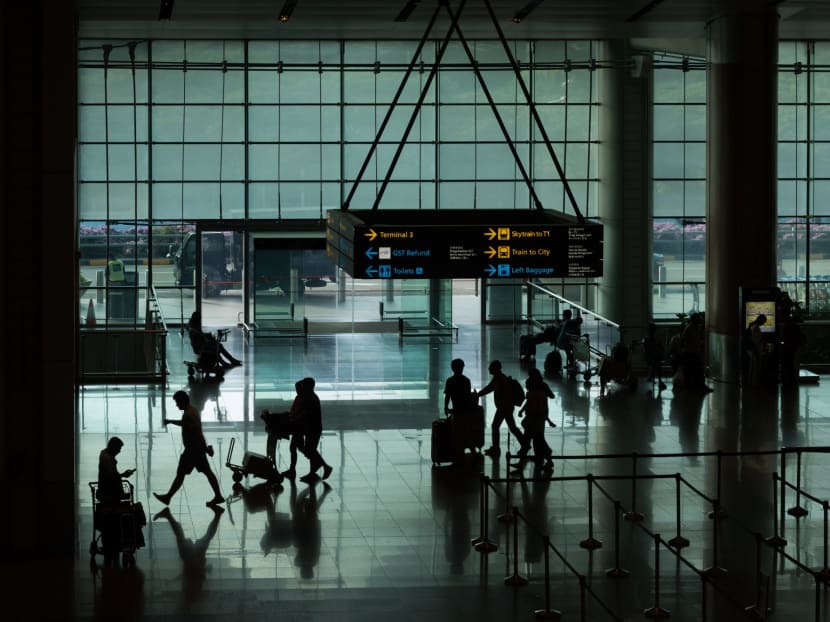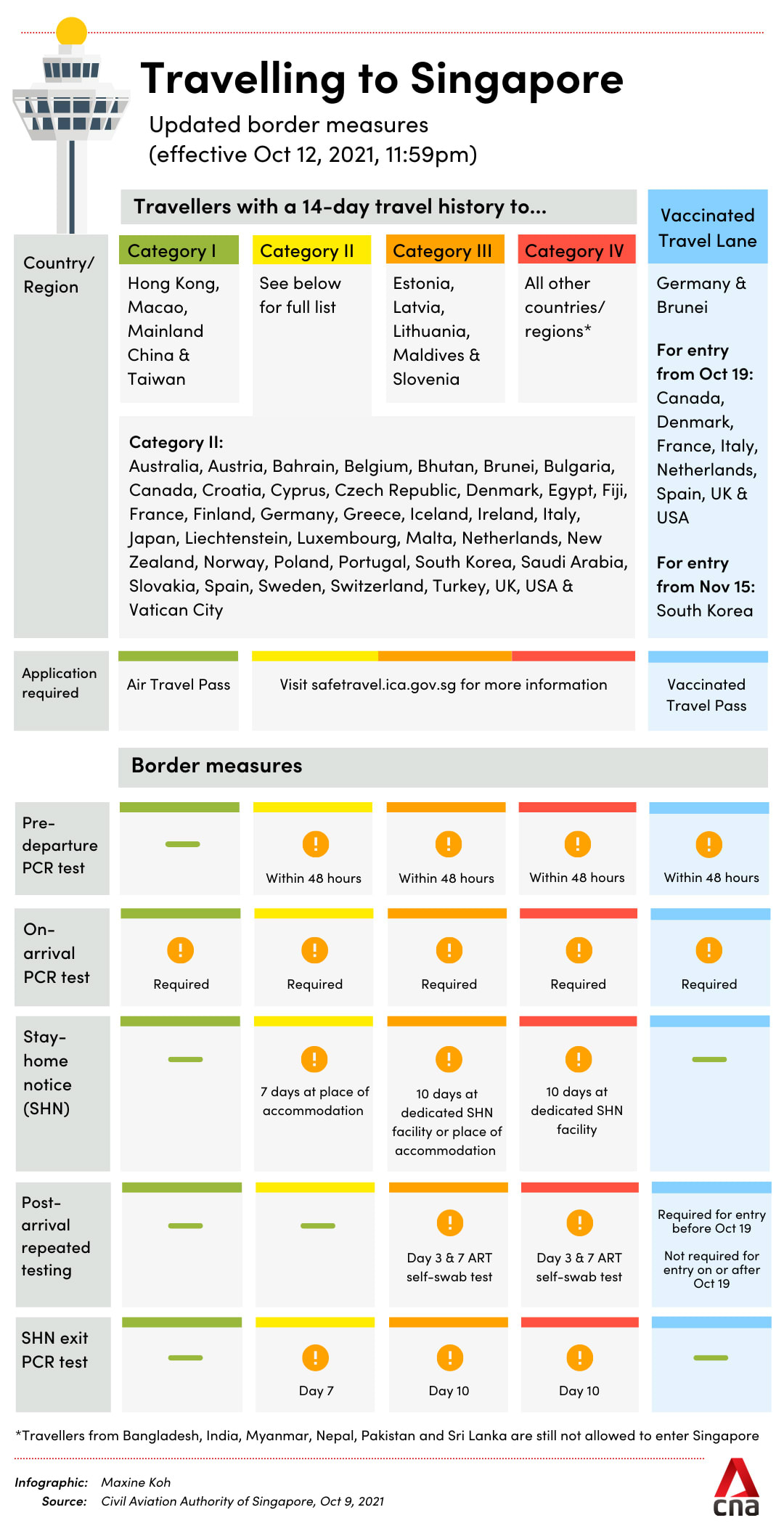Vaccinated and want to travel? Here's what you need to know

Travellers at Changi Airport in Singapore. (File photo: iStock/Stephane Jaquemet)
SINGAPORE: From next Tuesday (Oct 19), fully vaccinated Singapore residents will be able to travel to more countries under the vaccinated travel lane (VTL) scheme.
This is the most significant relaxation of border restrictions for the country in about two years since the COVID-19 pandemic and it's no wonder people are starting to weigh the risks of travelling for leisure.
Where can you go, what tests do you need to take and can unvaccinated children travel without quarantine?
We answer some of these questions for you:
WHAT ARE THE COUNTRIES YOU CAN TRAVEL TO UNDER VACCINATED TRAVEL LANES?
Vaccinated travel lanes were launched with Germany and Brunei on Sep 8.
From Oct 19, VTLs will be extended to Canada, Denmark, France, Italy, Netherlands, Spain, the United Kingdom and the United States. From Nov 15, vaccinated travel will start with South Korea.
This makes for a total of 11 countries under the VTL scheme.

HOW MANY COVID-19 TESTS DO YOU NEED TO TAKE?
The entry restrictions for each of the VTL countries varies from three in South Korea to none for some. Check the country list below for more details.
To enter Singapore under the VTL scheme, two tests are required.
A COVID-19 polymerase chain reaction (PCR) test needs to be taken within 48 hours before departure to Singapore and another test needs to be done on arrival.
Travellers should remain self-isolated until their on-arrival test result is confirmed to be negative.
This means immediately driving, taking a taxi or private hire car from the airport to their declared place of accommodation, and isolating alone or with household members who are vaccinated and have the same travel history, arrival date and self-isolation requirement.
If there are other occupants in the accommodation, travellers must isolate in an individual room with an ensuite toilet. The test results will be out within 24 hours.
The two PCR tests is down from four previously, as tests on days three and seven after arrival in Singapore have been scrapped.
WHAT OTHER CRITERIA ARE THERE?
Designated flights, travel history
Those who are travelling to Singapore under the VTL must do so via designated VTL flights. They may transit via another VTL country to take the designated flight into Singapore.
VTL travellers must have remained in one or more of the VTL countries in the last 14 consecutive days before departure to Singapore. If they have been in Singapore within those last 14 days, that counts towards fulfilling the travel history requirement.
Fully vaccinated
They must of course be fully vaccinated - meaning that it has been at least two weeks after getting the full regimen of Pfizer-BioNTech/Comirnaty, Moderna or other World Health Organisation (WHO) Emergency Use Listing vaccines.
They also need to present proof of vaccination, which can be issued in any VTL country or Singapore, regardless of which VTL country the traveller departs from.
Acceptable vaccination certificates include:
Singapore: Vaccination status on the HealthHub or TraceTogether app
EU countries: European Union Digital Covid Certificates (EUDCC) issued by VTL countries
Canada and the US: Only the Smart Health Card (SHC) format, issued by Canada or the US on the Common Trust Network are accepted
The UK: National Health Service (NHS) COVID Passes downloaded from the NHS mobile app
South Korea: Vaccination certificates issued by the Korean Disease Control and Prevention Agency (KDCA), as well as authorised clinics and hospitals
CovPass and the WHO Yellow Card will not be accepted. Residents of Singapore or the EU who were previously unvaccinated and had recovered from a past COVID-19 infection are considered fully vaccinated if they have received at least one dose of an approved vaccine. Such travellers will be required to provide an EU recovery certificate from COVID-19, or a discharge memo issued in Singapore.
Tourists, long-term pass holders
Short-term visitors and long-term pass holders will need to apply for a vaccinated travel pass (VTP) to enter Singapore under the VTL. This is not necessary for fully vaccinated Singapore citizens and permanent residents.
This is different from a visa, and short-term visitors who need a visa must apply for that separately after receiving their VTP approval.
They must also buy travel insurance with a minimum coverage of S$30,000 for COVID-19-related medical treatment and hospitalisation costs before travelling to Singapore. In addition, these visitors must use the TraceTogether app in Singapore to facilitate contact tracing.
WHAT ABOUT CHILDREN UNDER 12?
Children under 12, who are ineligible for vaccination, can enter Singapore under the VTL scheme if they are accompanied by a fully vaccinated adult travelling under the scheme.
The exception is entry to South Korea where children or people who are medically unfit to be vaccinated are not allowed to travel under the VTL.
They also need to undergo pre-departure and on-arrival PCR tests, except for young children aged two years and below.
The age of the child will be based on the calendar year. For example, a child born in or after 2009 will be allowed to enter Singapore under the vaccinated travel lane in 2021.
They also need to adhere to all other vaccinated travel lane requirements.
WHAT ARE THE ENTRY REQUIREMENTS FOR DIFFERENT COUNTRIES?
Brunei
As of Oct 12, Brunei still does not allow general travel in the country.
Canada
COVID-19 tests: All travellers five years or older, vaccinated or otherwise, must provide proof of a negative PCR test result taken within 72 hours of their scheduled departure time to enter Canada. Other molecular tests are accepted but not antigen rapid tests (ART).
Those who have had COVID-19 earlier can provide proof of a previous positive test result taken between 14 and 180 days ago.
Some travellers may be randomly selected for a mandatory test on arrival. It must be completed within 24 hours of entering Canada but there’s no need to wait for the results.
Vaccination certificate: Travellers must enter their proof of vaccination and travel information in ArriveCAN, which is free to use, up to 72 hours before the trip.
Otherwise they won't be considered as a fully vaccinated traveller, even if they meet all the other requirements. Travellers also need to bring the original proof of vaccination while they travel and for 14 days after entry.
Others: Unvaccinated children under 12 who are accompanied by fully vaccinated travellers must follow all testing requirements unless they are under the age of five. They do not need to quarantine as long as they follow the public health requirements.
More information is available online.
Denmark
COVID-19 tests: Fully vaccinated visitors from Singapore can enter Denmark without restrictions, and no tests or quarantine is required.
Singapore is currently classified as a “Yellow” or lower-risk country and the rules may change if the category changes.
Vaccination certificate: The vaccine must be approved by the European Medicines Agency (EMA). This means that Denmark does not recognise the Sinovac or Sinopharm vaccine.
EMA has approved four vaccines - Pfizer-BioNTech/Comirnaty, Moderna, Oxford/AstraZeneca and Johnson & Johnson.
The vaccine must have been taken in the last 12 months.
A full overview of the rules and regulations are available here.
France
COVID-19 tests: Fully vaccinated individuals are not subject to any health measures as Singapore is on France’s “Green” list.
Vaccine certificate: France also does not accept Sinovac or Sinopharm as only vaccines authorised by the EMA will be accepted.
Others: Unvaccinated travellers aged 11 years or older must present a negative PCR or antigenic test taken less than 72 hours before the flight.
More information on whether you can enter France is available here.
Germany
COVID-19 tests: Travellers from Singapore to Germany can travel quarantine-free with no testing.
Vaccination certificate: All travellers 12 years and older arriving in Germany have to furnish proof of vaccination or recovery from COVID-19 or a test certificate. Sinovac or Sinopharm vaccinations are not accepted.
Travellers may use their digital or paper certificate from Singapore to prove their vaccination status. To generate the vaccination card, log in to HealthHub and navigate to the section labelled "COVID-19 records" to download the PDF.
In addition to this, it is recommended that you authenticate your certificate via Notarise.
The German Embassy in Singapore has further information on its website.
Italy
COVID-19 tests: Vaccinated visitors from Singapore need to present a certificate of vaccination with an EMA-authorised vaccine.
They also need to take a PCR or ART test 72 hours before they arrive, with a negative result. Children aged five or younger do not have to take a COVID-19 test.
Vaccination certification: These are accepted - An EU Digital Covid Certificate (EU DCC); or a COVID-19 vaccination certificate showing that they were fully vaccinated with AstraZeneca (Vaxzevria), Janssen, Moderna or Pfizer-BioNTech (Comirnaty) at least 14 days before arrival. The certificate must be in English, French, Italian or Spanish.
More information is available online.
Netherlands
COVID-19 tests: All travellers from Singapore are allowed to enter the Netherlands without the need for a test or for quarantine.
Vaccination certificate: The Netherlands accepts both EMA and WHO Emergency Use Listing vaccines. These include: Astra Zeneca (Vaxzevria), Pfizer-BioNTech (Comirnaty), Johnson & Johnson (Janssen), Moderna (Spikevax), Serum Institute of India (Covishield), Sinopharm and Sinovac.
Requirements for proof of vaccination are available here.
South Korea
COVID-19 tests: Travellers are required to take a pre-departure PCR test within 72 hours before the scheduled departure time to South Korea and test negative.
They also need to take an on-arrival PCR Test. Travellers must make an online reservation for the test at any of the three COVID-19 testing centres in Incheon International Airport before leaving Singapore.
They must receive the COVID-19 PCR test at the COVID-19 testing centre located in Incheon International Airport upon arrival. The test result should be ready in 12 hours.
After taking the test, travellers must install the Self-Check Mobile App and leave the centre by taking either a taxi or personal vehicle to their hotel or other accommodation and stay there until they are notified via email that they have tested negative for COVID-19.
They will be required to update their daily health status in the Self-Check Mobile App for the duration of their stay, up to 14 days. Those staying for more than 14 days will not be required to update the app after that.
Those who remain in South Korea for eight days or more are required to take a PCR test at a medical clinic designated by Korean government on day six or day seven of their stay at their own expense.
The cost of the PCR test ranges from 135,000 to 180,000 won (S$150 to S$200). If the traveller tests positive for COVID-19, they will be quarantined and treated at hospitals designated by the government and will be responsible for their medical expenses.
Vaccination certificate: A traveller must present proof of vaccination issued either in South Korea or Singapore.
An individual is considered fully vaccinated 14 days after receiving the full regimen of PfizerBioNTech/Comirnaty, Moderna or other World Health Organisation (WHO EUL) Emergency Use Listing vaccines. This includes mix-and-match vaccinations, as long as the doses are on the WHO EUL.
Others: For South Korea, unvaccinated children and those who are medically unfit to be vaccinated cannot travel under the VTL.
Short-term visitors must purchase travel insurance for the entire duration of their stay, with a minimum coverage of 30 million won (about S$34,000) for COVID-19-related medical treatment and hospitalisation costs.
They have to carry with them a physical copy of their insurance policy. Should their COVID-19 treatment cost go beyond 30 million won, visitors will have to pay for the excess.
The Civil Aviation Authority of Singapore has issued a list of requirements for travellers seeking entry into South Korea.
Spain
COVID-19 tests: Travellers from Singapore are currently exempted from taking a COVID-19 test and do not need to provide a vaccination certificate, as long as they have been in Singapore in the last 14 days.
Others: Travellers must complete the Health Control Form on the website or the app, and can submit it from 48 hours before the flight.
United Kingdom
COVID-19 tests: Travellers must book and pay for a day two COVID-19 test to be taken after arrival.
Vaccination certificates: Recognised vaccines include Oxford/AstraZeneca, Pfizer-BioNTech, Moderna and Janssen.
Those who have recovered from COVID-19 also need both doses of any two-dose vaccine.
Vaccination certificates must be issued by a national or state-level public health authority and the UK government has a list of countries and territories with approved proof of vaccination for travel to England. Singapore is included in the list.
United States
COVID-19 tests: All travellers aged two years or older must present a negative COVID-19 test taken within three calendar days of departure. They may also show proof of recovery from the virus within the last 90 days.
The Centers for Disease Control and Prevention has further recommendations for travellers who intend to visit the US.
BOOKMARK THIS: Our comprehensive coverage of the COVID-19 pandemic and its developments
Download our app or subscribe to our Telegram channel for the latest updates on the coronavirus pandemic: https://cna.asia/telegram











